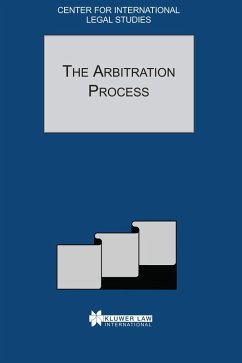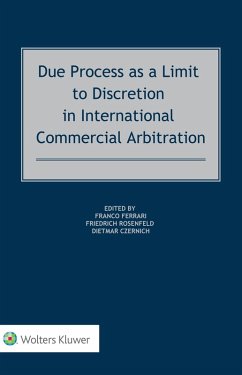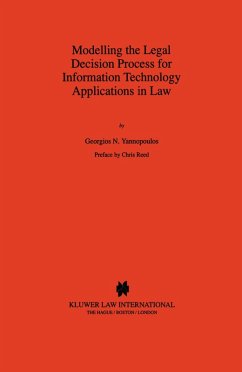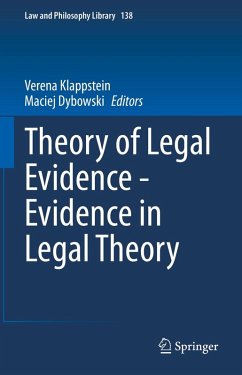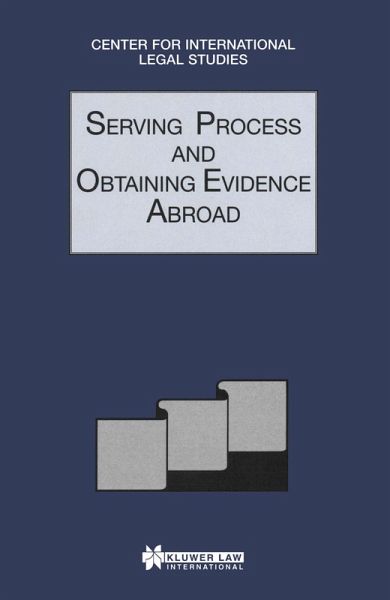
Serving Process and Obtaining Evidence Abroad (eBook, PDF)
Serving Process and Obtaining Evidence Abroad
Redaktion: Cotter, Susan
Versandkostenfrei!
Sofort per Download lieferbar
299,95 €
inkl. MwSt.

PAYBACK Punkte
150 °P sammeln!
This year''s Special lssue of the Comparative Law Yearbook of International Business is devoted to the topic of international judicial assistance.Bringing proceedings and obtaining and enforcing judgments is not an easy process under ordinary circumstances, but this is further complicated if the defendant is a foreign national or resides abroad, as he will therefore fall within the jurisdiction of another state. For reasons of state sovereignty and international relations, citizens of other states cannot be proceeded against in the same way as a country''s own nationals. Initiating proceedings...
This year''s Special lssue of the Comparative Law Yearbook of International Business is devoted to the topic of international judicial assistance.
Bringing proceedings and obtaining and enforcing judgments is not an easy process under ordinary circumstances, but this is further complicated if the defendant is a foreign national or resides abroad, as he will therefore fall within the jurisdiction of another state. For reasons of state sovereignty and international relations, citizens of other states cannot be proceeded against in the same way as a country''s own nationals. Initiating proceedings against someone who is abroad requires the permission, and often the assistance, of the authorities of the foreign state. Assistance is needed especially in relation to, inter alia, the service of documents, discovery and the taking of evidence from parties or witnesses to the proceedings.
Due to the ever-increasing volume of international trade being undertaken in today''s modern society, joint ventures and business contracts now involve parties from all over the globe. In any business arrangement, there is the possibility that the need for litigation will arise, and multi-national ventures are no exception. There is, therefore, a large number of commercial actions brought which require assistance from the authorities of other states. Aside from the commercial field, with the aid of improvements to international travel and communication, many people are able to conduct their private lives between various different countries. This means that private disputes, for example the abduction of children, may also involve parties of various nationalities.
In order to pave the way for these and other proceedings, a number of multinational treaties have been entered into, which lay down guidelines as to the assistance to be given to foreign judicial systems. These include the Hague Service Convention, the Hague Evidence Convention and the Brussels and Lugano Conventions. In addition, many countries have entered into bilateral treaties based upon the principle of reciprocity.
This book explores the rights of countries to request assistance and their rights to refuse assistance. It covers the methods by which assistance may be obtained, for example through the judiciary or through diplomatic channels, and the issue of sovereign immunity. Also, this work discusses the use of letters rogatory, an important tool in the obtaining of assistance abroad, and raises the issue of differences between Common Law and Civil Law jurisdictions, especially with regard to the process of discovery of evidence.
Bringing proceedings and obtaining and enforcing judgments is not an easy process under ordinary circumstances, but this is further complicated if the defendant is a foreign national or resides abroad, as he will therefore fall within the jurisdiction of another state. For reasons of state sovereignty and international relations, citizens of other states cannot be proceeded against in the same way as a country''s own nationals. Initiating proceedings against someone who is abroad requires the permission, and often the assistance, of the authorities of the foreign state. Assistance is needed especially in relation to, inter alia, the service of documents, discovery and the taking of evidence from parties or witnesses to the proceedings.
Due to the ever-increasing volume of international trade being undertaken in today''s modern society, joint ventures and business contracts now involve parties from all over the globe. In any business arrangement, there is the possibility that the need for litigation will arise, and multi-national ventures are no exception. There is, therefore, a large number of commercial actions brought which require assistance from the authorities of other states. Aside from the commercial field, with the aid of improvements to international travel and communication, many people are able to conduct their private lives between various different countries. This means that private disputes, for example the abduction of children, may also involve parties of various nationalities.
In order to pave the way for these and other proceedings, a number of multinational treaties have been entered into, which lay down guidelines as to the assistance to be given to foreign judicial systems. These include the Hague Service Convention, the Hague Evidence Convention and the Brussels and Lugano Conventions. In addition, many countries have entered into bilateral treaties based upon the principle of reciprocity.
This book explores the rights of countries to request assistance and their rights to refuse assistance. It covers the methods by which assistance may be obtained, for example through the judiciary or through diplomatic channels, and the issue of sovereign immunity. Also, this work discusses the use of letters rogatory, an important tool in the obtaining of assistance abroad, and raises the issue of differences between Common Law and Civil Law jurisdictions, especially with regard to the process of discovery of evidence.
Dieser Download kann aus rechtlichen Gründen nur mit Rechnungsadresse in A, B, BG, CY, CZ, D, DK, EW, E, FIN, F, GR, HR, H, IRL, I, LT, L, LR, M, NL, PL, P, R, S, SLO, SK ausgeliefert werden.





